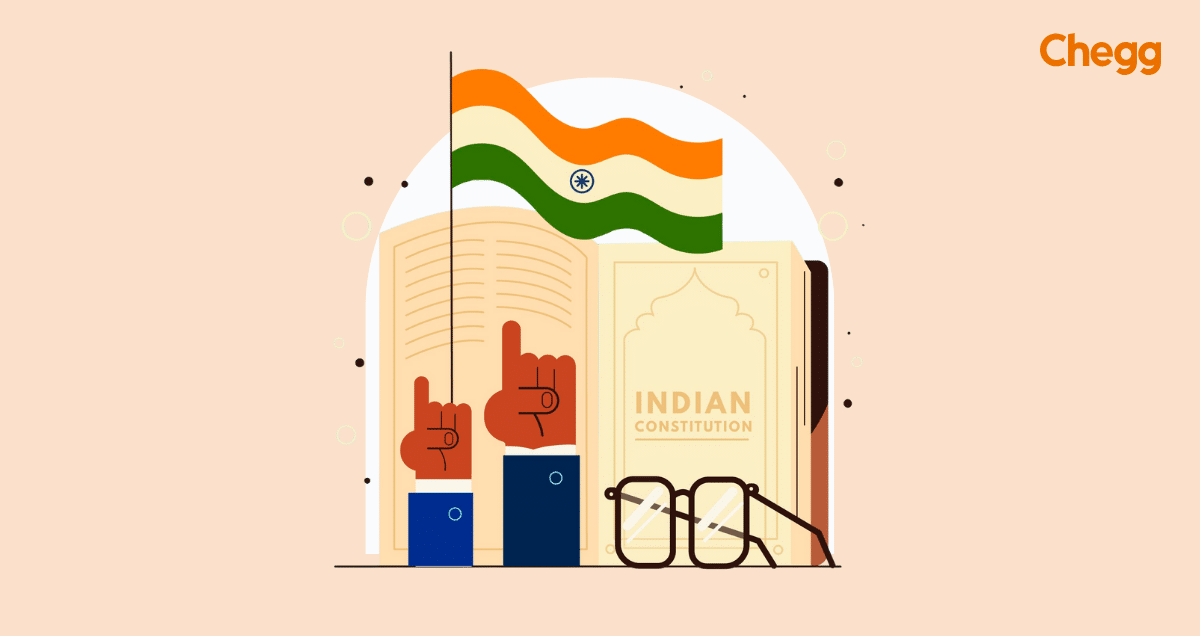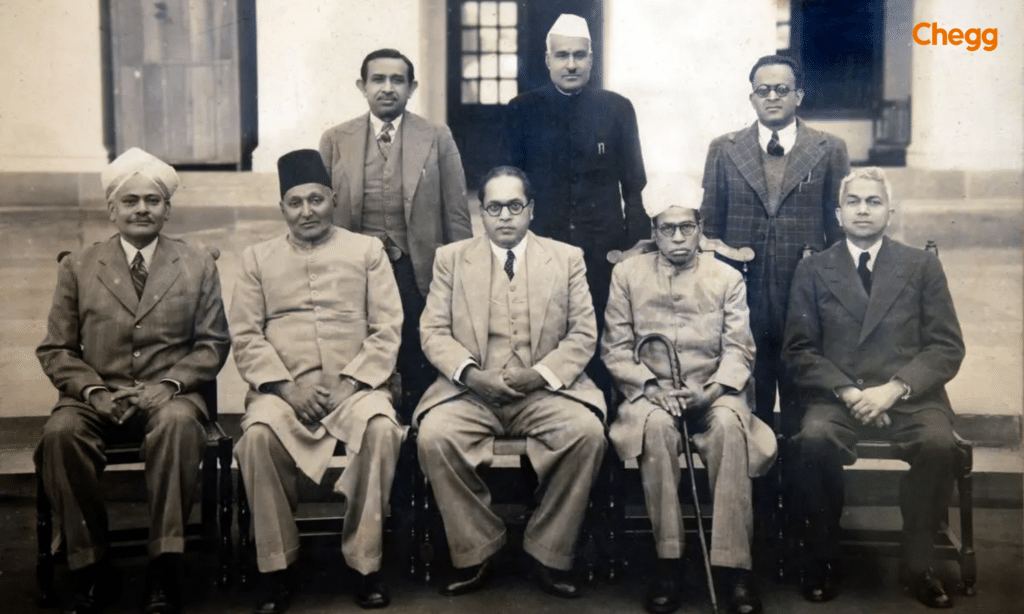
Quick Summary
Table of Contents
The Important Articles of Indian Constitution: India, as the world’s largest democracy, adopted its constitution on January 26, 1950, following nearly 200 years of colonial rule, numerous freedom struggles, the Indian national movement, sectarian conflicts, and a rich historical heritage.
This constitution delineates the roles and responsibilities of the judiciary, legislature, and executive branches of government. It includes significant articles that outline fundamental rights, political principles, procedures, and responsibilities. This constitutional framework has played an important role in ensuring unity in diversity in the country.
The important articles of the Indian Constitution are integral to the Indian Polity section of competitive exam syllabi, notably included in the UPSC syllabus.

The making of the Indian constitution was a planned process. It involved several keystones and notable figures. The submission of a revised draft constitution to the Constitution Assembly was an important moment in the journey. The date of submission was November 4, 1947.
Dr B R Ambedkar chaired the drafting committee. He played a vital role in shaping the Indian Constitution. The committee included seven more members who were:
All these members prepared an inclusive Constitution for the new independent nation. Its philosophy resides in:
It aimed to establish a democratic, secular, and socialist republic. The same would safeguard the rights and freedoms of all its citizens. The Constitution drew inspiration from various sources. It included the ideals of Mahatma Gandhi and the constitutional experiences of other nations as well. The Important Articles of Indian Constitution also included the wisdom of India’s historical heritage.
The Constituent Assembly was formed on December 9, 1946. It engaged in intensive discussions and debates for around three years. The Assembly adopted the final version of the Indian Constitution on January 26, 1950. The day is now celebrated as Republic Day. The occasion marks the commencement of India as a Republic nation.
The Indian Constitution is one of the most extensive legal documents in the world. It acts as the cornerstone of the nation’s governance. Currently, the total articles in the Indian Constitution are 448. These articles form the backbone of India’s constitutional framework. They also define the structure of the government. It helps outline the powers and responsibilities of various institutions. The articles further help safeguard the rights and freedom of citizens.
The country adopted the Constitution of India on November 26, 1949. It included the Preamble and 395 articles. There are 25 total parts of Indian Constitution, the early version consisted of 22 parts and 8 schedules. Each section addressed different sides of governance and administration. The Important Articles of Indian Constitution ensured justice, democracy, and fundamental rights for all.
| Part | Subject Matter | Articles |
|---|---|---|
| Part I | The Union and its territory | Articles 1 to 4 |
| Part II | Citizenship | Articles 5 to 11 |
| Part III | Fundamental Rights | Articles 12 to 35 |
| Part IV | Directive Principles of State Policy | Articles 36 to 51 |
| Part IVA | Fundamental Duties | Article 51A |
| Part V | The Union | Articles 52 to 151 |
| Part VI | The States | Articles 152 to 237 |
| Part VIII | The Union Territories | Articles 239 to 242 |
| Part IX | The Panchayats | Articles 243 to 243O |
| Part IXA | The Municipalities | Articles 243P to 243ZG |
| Part IXB | Co-operative Societies | Articles 243H to 243ZT |
| Part X | The Scheduled and Tribal Areas | Articles 244 to 244A |
| Part XI | Relations between the Union and the States | Articles 245 to 263 |
| Part XII | Finance, Property, Contracts, and Suits | Articles 264 to 300A |
| Part XIII | Temporary, Transitional, and Special Provisions | Articles 301 to 307 |
| Part XIV | Services under the Union and the States | Articles 308 to 323 |
| Part XIVA | Tribunals | Articles 323A and 323B |
| Part XV | Elections | Articles 324 to 329A |
| Part XVI | Special provisions relating to certain classes | Articles 330 to 342 |
| Part XVII | Official Language | Articles 343 to 351 |
| Part XVIII | Emergency Provisions | Articles 352 to 360 |
| Part XIX | Miscellaneous | Articles 361 to 367 |
| Part XX | Amendment to the Constitution | Article 368 |
| Part XXI | Temporary, Transitional and Special Provisions | Articles 369 to 392 |
| Part XXII | Short title, commencement, authoritative text in Hindi, and repeals | Articles 393 to 395 |
The Indian Constitution, meticulously crafted by Dr. B.R. Ambedkar and his committee, stands as the supreme law of the land. It enshrines fundamental rights, outlines the government’s framework, and establishes principles for a just and equitable society. Understanding key articles empowers you to be an informed and active citizen.
These articles form the bedrock of individual liberties in India.
| Article | Brief Description | Significance |
| 14 | Right to Equality | Guarantees equal treatment under the law for all citizens. |
| 19 | Protection of Certain Rights Regarding Freedom | Enshrines fundamental freedoms of speech, assembly, movement, association, and profession. |
| 21 | Right to Life and Personal Liberty | Protects an individual’s right to life and liberty. |
| 32 | Remedies for Enforcement of Fundamental Rights | Empowers citizens to seek legal recourse if their fundamental rights are violated. |
These articles define the framework for India’s government.
| Article | Brief Description | Significance |
| 40 | Organization of Village Panchayats | Lays the foundation for self-governance at the village level. |
| 50 | Separation of the Judiciary from the Executive | Ensures an independent judiciary, crucial for a fair legal system. |
| 72 | Power of the President to Grant Pardons | Grants the President the authority to pardon or reduce sentences. |
| 74 | Council of Ministers to Aid and Advise the President | Establishes the Council of Ministers to advise and assist the President. |
| 84 | Qualification for Membership of the Parliament | Defines eligibility criteria for becoming a member of Parliament. |
| 124 | Establishment and Constitution of the Supreme Court | Establishes the Supreme Court of India as the highest court. |
| 155 | Appointment of Governor | Defines the process for appointing the Governor of a state. |
| 356 | President’s Rule in States | Empowers the President to impose President’s rule in a state facing a crisis. |
| 368 | Power of Parliament to Amend the Constitution | Outlines the process for amending the Constitution. |
These articles reflect India’s commitment to progress and social justice.
| Article | Brief Description | Significance |
| 44 (Not Yet Implemented) | Uniform Civil Code | Asks the state to strive for a uniform set of personal laws, promoting equality. |
| 48A | Protection and Improvement of the Environment | Imposes a duty on the state to protect the environment. |
| 51A | Fundamental Duties of Citizens | Defines the duties of Indian citizens, fostering a sense of responsibility. |
| 377 | Decriminalization of Homosexuality | Recognizes the rights and dignity of LGBTQ+ individuals, promoting inclusivity. |
| Schedule | Contents |
|---|---|
| First Schedule | Contains the names of States and Union Territories. – Specifies the territorial jurisdiction of each state. |
| Second Schedule | Provides details about the allowances, privileges, and emoluments of various officials, including the President, Governors, Speakers, and Judges. |
| Third Schedule | Contains the forms of oath and affirmation for Union Ministers, Members of Parliament (MPs), Supreme Court Judges, and others. |
| Fourth Schedule | Deals with the allocation of seats for states and union territories in the Rajya Sabha (Council of States). |
| Fifth Schedule | Pertains to the administration and control of scheduled areas and scheduled tribes. |
| Sixth Schedule | Covers the administration of tribal areas in the states of Assam, Meghalaya, Tripura, and Mizoram. |
| Seventh Schedule | Divides legislative powers between the Union and the States through three lists: Union List, State List, and Concurrent List. |
| Eighth Schedule | Recognizes 22 official languages of India, including Assamese, Bengali, Hindi, Kannada, Tamil, and Urdu. |
| Ninth Schedule | Protects certain laws from judicial scrutiny on the grounds of violating fundamental rights. – Primarily related to land reforms and zamindari abolition. |
| Tenth Schedule | Known as the Anti-Defection Law, it deals with disqualification of MPs and MLAs who switch parties. |
| Eleventh Schedule | Contains provisions related to Panchayats (local self-government institutions). |
| Twelfth Schedule | Pertains to Municipalities (urban local bodies). |
Some tips to help remember the important articles of the Indian Constitution:
Remember to practice and repeat these techniques to master the Constitution’s articles.
Understanding the Important Articles of Indian Constitution UPSC intricacies is crucial for UPSC aspirants aiming to crack the Civil Services Exam. The Constitution outlines fundamental rights, directive principles, fundamental duties, and the powers and limitations of various institutions.
The Indian Constitution is a recurring theme across various UPSC papers, including General Studies I, II, III, and IV. A thorough understanding of the imp articles of indian constitution UPSC is essential for the:
By mastering these crucial articles, you’ll gain a strong foundation for tackling UPSC questions related to the Important Articles of Indian Constitution and emerge as a well-informed candidate.
The Staff Selection Commission (SSC) conducts exams for various government positions in India. A good understanding of the Important Articles of Indian Constitution for SSC is crucial for these exams, especially since it forms the foundation of the country’s legal and administrative framework.
The Indian Constitution stands as the supreme, living document that forged the world’s largest democracy. Its most important articles provide the essential framework for national governance, embedding core principles like justice, equality, and fundamental rights for every citizen. From the foundational Article 1, which defines India’s identity as a Union of States, to the detailed provisions for governance and power distribution, it operationalizes the vision of its founding fathers. This visionary blueprint continues to actively guide the nation’s progress, safeguard its democratic integrity, and ensure unity and social justice for all future generations.
Read More:-
While several articles form the cornerstone of the Indian Constitution, Article 32 is widely regarded as the most crucial. Hailed by Dr. B. R. Ambedkar as the “soul of the Constitution and the very heart of it,” this article grants every citizen the Right to Constitutional Remedies. This fundamental right empowers individuals to directly approach the Supreme Court to enforce their other Fundamental Rights (Articles 12-35). By providing the tools to seek justice through writs, Article 32 acts as the ultimate guardian and practical enforcer of all other rights, making the Constitution a living, breathing document of justice rather than a mere symbolic text.
The Indian Constitution originally had 395 Articles in 1950. After several amendments, it now contains 470 Articles divided into 25 Parts and 12 Schedules. However, many exam books and references still mention 448 Articles because they count only up to the 94th Amendment (2006). The updated official count is 470 Articles, making it the correct and current number.
Article 21 states that “No person shall be deprived of his life or personal liberty unless by procedure prescribed by law.” All people, citizens and non-citizens alike, are entitled to this fundamental right.
The abolition of titles is discussed in Article 18. It states: The State shall not grant any title that is not a military or academic honor. India’s citizens are not allowed to take on any titles from other countries.
No, Article 21, which guarantees the right to life and personal liberty, cannot be suspended even during a state of emergency. The 44th Amendment Act of 1978 ensures that Articles 20 and 21 remain protected and enforceable under all circumstances, safeguarding fundamental rights.
Article 395 repeals the Indian Independence Act, 1947, and the Government of India Act, 1935, together with all enactments amending or supplementing the latter Act, but not including the Abolition of Privy Council Jurisdiction Act, 1949.
Articles 308 to 320 of the Indian Constitution fall under Part XIV, dealing with Services under the Union and the States. These Articles define the rules regarding recruitment, service conditions, and the role of Public Service Commissions (UPSC and State PSCs). They cover provisions such as the Union and State Services, Public Service Commission functions, and powers related to appointments and disciplinary matters, ensuring transparency and merit in government jobs.
Article 74 establishes the Council of Ministers to advise the President, who is bound by this advice. Article 75 deals with the appointment of the Prime Minister and other ministers by the President, their collective responsibility to the Lok Sabha, and their terms of office. Together, they form the core of India’s cabinet system of government.

Authored by, Muskan Gupta
Content Curator
Muskan believes learning should feel like an adventure, not a chore. With years of experience in content creation and strategy, she specializes in educational topics, online earning opportunities, and general knowledge. She enjoys sharing her insights through blogs and articles that inform and inspire her readers. When she’s not writing, you’ll likely find her hopping between bookstores and bakeries, always in search of her next favorite read or treat.
Editor's Recommendations
Chegg India does not ask for money to offer any opportunity with the company. We request you to be vigilant before sharing your personal and financial information with any third party. Beware of fraudulent activities claiming affiliation with our company and promising monetary rewards or benefits. Chegg India shall not be responsible for any losses resulting from such activities.
Chegg India does not ask for money to offer any opportunity with the company. We request you to be vigilant before sharing your personal and financial information with any third party. Beware of fraudulent activities claiming affiliation with our company and promising monetary rewards or benefits. Chegg India shall not be responsible for any losses resulting from such activities.